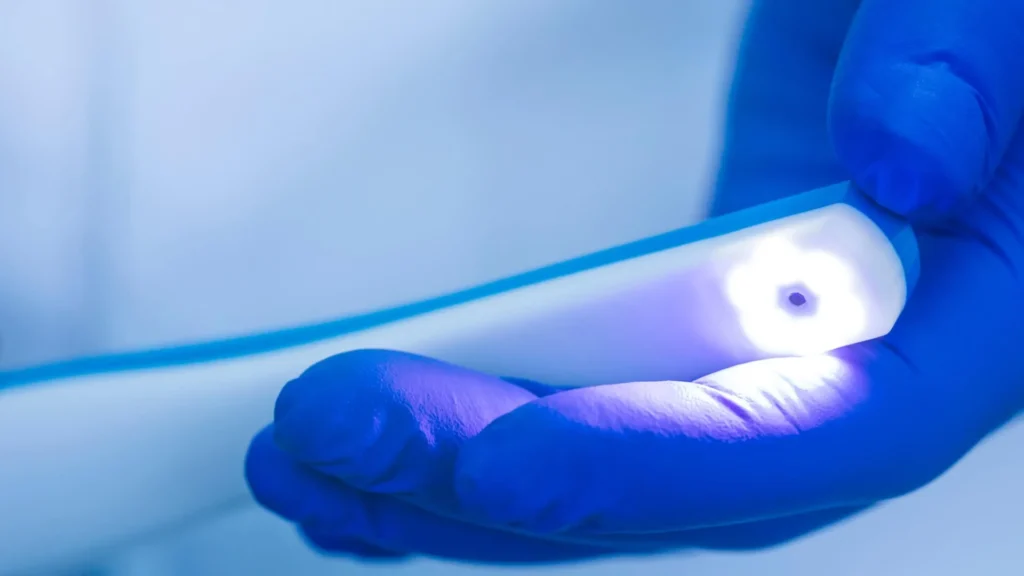What is an ERCP?
Gastroenterology Associates carries out endoscopic procedures to identify a number of digestive health conditions in patients. An endoscopic retrograde cholangiopancreatography (ERCP) is an endoscopic procedure where a slender, flexible “scope” or tube is inserted into the oral cavity and gently moved to the duodenum or first portion of the small intestine. The device houses a light and a camera that allow your gastroenterologist to examine the inner wall of the esophagus, stomach, small intestine, the opening to the bile duct, and the pancreatic duct. An ERCP test may be needed to identify the source of gastrointestinal issues, such as:
- Abnormal x-ray results
- Abdominal pain
- Abnormal results from a liver test
- Pancreatitis
Please call one of our Baton Rouge, LA locations today to request a consultation with a GI doctor to learn further details about this endoscopic procedure.

What are the benefits of an ERCP?
An ERCP procedure may be performed if you have abnormal liver results after a blood test, if you have pancreatic inflammation, or if you experience symptoms such as abdominal pain or discomfort or yellowing of the eyes and skin. Benefits of this test include:
- Reduced recovery times: Individuals often have expedited recovery periods with an ERCP compared to traditional surgical approaches, allowing for a faster return to normal daily activities.
- Enhanced precision: An ERCP allows for the precise visualization of and treatment within the pancreatic and biliary ducts, which is imperative for the correct diagnosis and treatment of a condition.
- Diagnostic and therapeutic: This approach may serve dual purposes, helping GI providers detect conditions and perform treatment within the same procedure. This can decrease the need for multiple treatments.
- Efficiency: The ability to identify and treat a health concern during one procedure often decreases the total treatment time for patients.
How can I prepare for my ERCP procedure?
Prior to your ERCP, you will be given instructions from our team about how to prepare and what to expect. You will likely be able to eat your normal diet the day leading up to the exam but should not consume anything by mouth after midnight except for medications. It is essential to adhere to the directions given to you by your provider. Additional information concerning your medications may be provided. In most instances, your medication schedule will be continued as normal. However, in certain circumstances, particularly in patients taking blood thinners (such as anti-inflammatories, aspirin, Coumadin®, Plavix®, and warfarin) and in diabetics, alternative instructions will be provided.
What happens the day of the ERCP procedure?
We will ask you to arrive for your ERCP about 1 – 1.5 hours before your exam. This will allow adequate time to fill out patient forms and prepare for the assessment. You will be asked to change into a medical gown. An intravenous (IV) catheter will be started in your arm to give sedation. Special equipment will also be used to will allow our staff to monitor your breathing, oxygen, pulse, blood pressure, heart rate, and electrocardiogram levels during and after the test.
When you enter the exam room, we will have you lie on your stomach on the table. The IV sedation will be started. Small amounts are provided at a time to ensure that you do not have an adverse reaction to the sedation medication and so we administer only the dosage you require. Compared with other endoscopic procedures, it is not uncommon for general anesthesia to be used for an ERCP. The endoscope will be inserted into the mouth when the appropriate sedation level is reached. The device will be gently forwarded through the esophagus and down into the stomach and small intestine to the area where the bile duct and pancreatic duct open into the small intestine. A small amount of air is administered via the scope into the gastrointestinal (GI) system to increase your provider’s visibility. A radiographic contrast dye is placed into the bile and pancreatic ducts and an x-ray machine is utilized to take images of these structures to determine if there are any concerns or irregularities. Any fluid remaining in the upper GI tract can be removed by way of the scope device. Depending on the findings of the exam, a few things may be carried out during the course of the procedure, such as biopsies, stent placement (metal/plastic tubes) into the bile or pancreatic ducts, sphincterotomy (opening the bile or pancreatic duct), and the removal of gallstones from the bile ducts or stones from the pancreatic ducts. When the ERCP is complete, as much of the air and remaining fluid as possible will be suctioned out via the endoscope. Each assessment takes around 30 – 90 minutes to complete based on your provider’s findings.
Once the evaluation has concluded, you will be moved to the post-treatment area to be assessed while the sedation medication begins to fade away. The portion of sedation given during the exam and how your body responds to it will determine how quickly you awaken; however, most individuals are alert enough for dismissal within 45 – 60 minutes. You cannot operate any vehicles for the rest of the day so you will need to plan to have a friend or relative take you home. You will also be directed not to work, perform strenuous activities, or sign important papers for the day. In most cases, patients can eat and drink as usual after being released from the endoscopy unit, although certain instructions regarding eating, activity, and medications will be provided before dismissal. In some cases, ERCP patients may be admitted for an overnight hospital stay for evaluation.
When can I expect my ERCP results?
When the ERCP is complete, your provider will review the test results with you. Generally, individuals do not remember what is discussed after the ERCP exam because of sedative effects. Our Gastroenterology Associates team recommends you bring someone with you to whom the exam findings can also be explained. You will also be given a typed synopsis and should be given any biopsy or other test results within one week.
What are the risks of an ERCP?
In general, an ERCP is known to be a very safe evaluation. In most instances, complications are not life-threatening. However, in the event a complication arises, it could lead to surgery and hospitalization. Prior to beginning the test, a consent form will be reviewed. The risks will once again be explained by the doctor before the ERCP procedure initiates, and any questions or concerns can be addressed.
A condition known as acute pancreatitis, or inflammation of the pancreas, is the most widespread complication, although it generally only occurs in 5 – 8% of cases, though, depending on the individual, the risk can run up to 20%. Indications of pancreatitis often include abdominal pain, nausea, vomiting, and possibly fever. Most cases are mild and require four or fewer days in the hospital. While hospitalized, patients usually only need IV fluids along with pain and nausea control. Rarely, however, pancreatitis can be more concerning and even life-threatening.
Adverse reactions from the sedation can arise. These can include breathing difficulties, allergic reactions, irritation of the vein used to give the medication, and effects on the blood pressure and heart. Bleeding can occur with a sphincterotomy or biopsy procedure. Significant bleeding, like that which might require hospitalization or a blood transfusion, is very uncommon.
Perforation or piercing of the esophagus, stomach, or small intestine can occur. Such an event may not be detected during the ERCP procedure, or it may not be recognized until a later time. In most instances, a puncture of this type will result in a hospital stay and surgery. However, this is a highly uncommon complication, even in the event that a biopsy or a sphincterotomy is performed.
Finally, among 5 – 10% of people, the ERCP evaluation might not be able to be conducted for various reasons. It is crucial that you get in touch with Gastroenterology Associates promptly if any symptoms become evident after the procedure, such as fever, worsening abdominal pain, or bleeding.
Like any other exam, ERCP is not perfect. There exists a small, accepted risk that conditions, including cancers, may not be noticed with the exam. It is critical to continue to follow up with Baton Rouge, LA gastroenterologist as advised and make them aware of any new or ongoing symptoms.
Are there any alternatives to an ERCP?
In certain cases, the alternative options to the ERCP will be based on the reason for needing an ERCP in the first place. For most individuals, the ERCP procedure is the top approach to examine and treat abnormalities in the pancreatic and biliary systems. However, an x-ray known as a magnetic resonance cholangiopancreatography (MRCP), percutaneous transhepatic cholangiogram (PTC), or echo-endoscopy or endoscopic ultrasound (EUS) can additionally be used to examine the bile ducts and pancreatic ducts. It’s important to note, however, that the MRCP is only used on a diagnostic basis, and abnormalities will need to be addressed through an ERCP or surgery. Moreover, percutaneous transhepatic cholangiograms and endoscopic ultrasounds do have treatment alternatives.

Expert care for endoscopic services
ERCP FAQs
What questions might be helpful to ask my provider about the ERCP procedure?
If an ERCP has been recommended for you, you’ll likely have a number of questions or may not know where to begin. A few questions to ask your GI provider may include:
- What does your gastroenterologist expect to find during this procedure?
- What is the overall success rate of an ERCP procedure?
- If a complication should occur, what symptoms or signs might you notice?
What should you avoid doing after an ERCP?
You should not operate a vehicle for 24 hours after having your ERCP procedure, as the sedative medication may take that long to fully leave your body. Because the effects of the sedation may linger, we recommend having a relative or friend take you home from your procedure. Our team might instruct you to hold off on eating for a certain amount of time, depending on the treatment performed during the course of the ERCP. Our team may also recommend that you take the rest of the day, and possibly the following day, off work. Your Gastroenterology Associates team can explain what to expect before, during, and after the ERCP procedure.
What procedures can be performed during an ERCP?
An ERCP allows a GI provider to perform several treatments. Some of the treatments commonly conducted during an ERCP are:
- Stent placement
- Tissue sampling
- Removal of bilestones
- Sphincterotomy of the biliary sphincter
How should I prepare for an ERCP?
Our Baton Rouge, LA digestive health team can administer details on preparing for an ERCP. However, some of the directions you may need to follow include:
- Do not drink or eat for eight hours before your ERCP procedure. (Water may be okay to consume. Check with your provider for confirmation.)
- Avoid smoking for eight hours before your procedure.
- Give your GI provider a list of all medications you take and any allergies you may have.
